#american safety and health institute
Text
Basic Life Support in Lahore on Apr 28
Basic Life Support (BLS) program is for participants to gain or improve knowledge and skill proficiency in high-quality CPR skills. In our hands-on approach, students participate in scenarios and learning stations to become a Lifesaver!
BLS reflects the latest resuscitation science and treatment recommendations published and conforms with the American Heart Association (AHA) Guidelines Update for…

View On WordPress
#Adult BLS#AHA#AHA BLS#AHA BLS and ASHI BLS#AHA BLS certification#American BLS Certification#American heart association#american safety and health institute#ashi#ASHI Basic Life Support#ASHI BLS#ASHI BLS Certification#ASHI BLS Course#ASHI BLS training#ASHI USA BLS#basic life support#Basic Life Support by American Safety and Health Institute#Basic Life Support by ASHI#Basic Life Support Certification#BLS certification#BLS certification course in Karachi#BLS certification in Karachi#BLS certification in Lahore#BLS Course#BLS course in Karachi#BLS course in Lahore#BLS for allied healthcare professionals#BLS for care providers#BLS for doctors#BLS for healthcare professionals
0 notes
Text
Things Biden and the Democrats did, this week #16
April 26-May 3 2024
President Biden announced $3 billion to help replace lead pipes in the drinking water system. Millions of Americans get their drinking water through lead pipes, which are toxic, no level of lead exposure is safe. This problem disproportionately affects people of color and low income communities. This first investment of a planned $15 billion will replace 1.7 million lead pipe lines. The Biden Administration plans to replace all lead pipes in the country by the end of the decade.
President Biden canceled the student debt of 317,000 former students of a fraudulent for-profit college system. The Art Institutes was a for-profit system of dozens of schools offering degrees in video-game design and other arts. After years of legal troubles around misleading students and falsifying data the last AI schools closed abruptly without warning in September last year. This adds to the $29 billion in debt for 1.7 borrowers who wee mislead and defrauded by their schools which the Biden Administration has done, and a total debt relief for 4.6 million borrowers so far under Biden.
President Biden expanded two California national monuments protecting thousands of acres of land. The two national monuments are the San Gabriel Mountains National Monument and the Berryessa Snow Mountain National Monument, which are being expanded by 120,000 acres. The new protections cover lands of cultural and religious importance to a number of California based native communities. This expansion was first proposed by then Senator Kamala Harris in 2018 as part of a wide ranging plan to expand and protect public land in California. This expansion is part of the Administration's goals to protect, conserve, and restore at least 30 percent of U.S. lands and waters by 2030.
The Department of Transportation announced new rules that will require car manufacturers to install automatic braking systems in new cars. Starting in 2029 all new cars will be required to have systems to detect pedestrians and automatically apply the breaks in an emergency. The National Highway Traffic Safety Administration projects this new rule will save 360 lives every year and prevent at least 24,000 injuries annually.
The IRS announced plans to ramp up audits on the wealthiest Americans. The IRS plans on increasing its audit rate on taxpayers who make over $10 million a year. After decades of Republicans in Congress cutting IRS funding to protect wealthy tax cheats the Biden Administration passed $80 billion for tougher enforcement on the wealthy. The IRS has been able to collect just in one year $500 Million in undisputed but unpaid back taxes from wealthy households, and shows a rise of $31 billion from audits in the 2023 tax year. The IRS also announced its free direct file pilot program was a smashing success. The program allowed tax payers across 12 states to file directly for free with the IRS over the internet. The IRS announced that 140,000 tax payers were able to use it over their target of 100,000, they estimated it saved $5.6 million in tax prep fees, over 90% of users were happy with the webpage and reported it quicker and easier than companies like H&R Block. the IRS plans to bring direct file nationwide next year.
The Department of Interior announced plans for new off shore wind power. The two new sites, off the coast of Oregon and in the Gulf of Maine, would together generate 18 gigawatts of totally clean energy, enough to power 6 million homes.
The Biden Administration announced new rules to finally allow DACA recipients to be covered by Obamacare. Deferred Action for Childhood Arrivals (DACA) is an Obama era policy that allows people brought to the United States as children without legal status to remain and to legally work. However for years DACA recipients have not been able to get health coverage through the Obamacare Health Care Marketplace. This rule change will bring health coverage to at least 100,000 uninsured people.
The Department of Health and Human Services finalized rules that require LGBTQ+ and Intersex minors in the foster care system be placed in supportive and affirming homes.
The Senate confirmed Georgia Alexakis to a life time federal judgeship in Illinois. This brings the total number of federal judges appointed by President Biden to 194. For the first time in history the majority of a President's nominees to the federal bench have not been white men.
#Thanks Biden#Joe Biden#student loans#loan forgiveness#lead poisoning#clean water#DACA#health care#LGBT rights#queer kids#taxes#tax the rich
4K notes
·
View notes
Text
10 reasons to make sure your sofa choices are upholstered with safely processed fabrics.
10 reasons to make sure your sofa choices are upholstered with safely processed fabrics.
If a fabric is identified as 100% “cotton” – or even 100% “organic cotton” — it’s important to remember that processing the fiber, and then weaving it into fabric, is very chemically intense. One-quarter of the total weight of the finished fabric is made up of synthetic chemicals, so it’s important to know that the chemicals used in your fabrics are safe! [1]
There have not been a lot of…
View On WordPress
#acrylic#American Federation of Government Employees#dioxins#formaldehyde#GoreTex#lead#National Institute for Occupational Safety and Health#PCB&039;s#PFC&039;s#TBP#Transportation Security Administration#United States#United States Environmental Protection Agency#USA
0 notes
Text
since we now know that all those "my blog is safe for Jewish people" posts are bullshit, here are some Jewish organizations you can donate to if you actually want to prove you support Jews. put up or shut up
FIGHTING HUNGER
Masbia - Kosher soup kitchens in New York
MAZON - Practices and promotes a multifaceted approach to hunger relief, recognizing the importance of responding to hungry peoples' immediate need for nutrition and sustenance while also working to advance long-term solutions
Tomchei Shabbos - Provides food and other supplies so that poor Jews can celebrate the Sabbath and the Jewish holidays
FINANCIAL AID
Ahavas Yisrael - Providing aid for low-income Jews in Baltimore
Hebrew Free Loan Society - Provides interest-free loans to low-income Jews in New York and more
GLOBAL AID
American Jewish Joint Distribution Committee - Offers aid to Jewish populations in Central and Eastern Europe as well as in the Middle East through a network of social and community assistance programs. In addition, the JDC contributes millions of dollars in disaster relief and development assistance to non-Jewish communities
American Jewish World Service - Fighting poverty and advancing human rights around the world
Hebrew Immigrant Aid Society - Providing aid to immigrants and refugees around the world
Jewish World Watch - Dedicated to fighting genocides around the world
MEDICAL AID
Sharsheret - Support for cancer patients, especially breast cancer
SOCIAL SERVICES
The Aleph Institute - Provides support and supplies for Jews in prison and their families, and helps Jewish convicts reintegrate into society
Bet Tzedek - Free legal services in LA
Bikur Cholim - Providing support including kosher food for Jews who have been hospitalized in the US, Australia, Canada, Brazil, and Israel
Blue Card Fund - Critical aid for holocaust survivors
Chai Lifeline - An org that's very close to my heart. They help families with members with disabilities in Baltimore
Chana - Support network for Jews in Baltimore facing domestic violence, sexual abuse, and elder abuse
Community Alliance for Jewish-Affiliated Cemetaries - Care of abandoned and at-risk Jewish cemetaries
Crown Heights Central Jewish Community Council - Provides services to community residents including assistance to the elderly, housing, employment and job training, youth services, and a food bank
Hands On Tzedakah - Supports essential safety-net programs addressing hunger, poverty, health care and disaster relief, as well as scholarship support to students in need
Hebrew Free Burial Association
Jewish Board of Family and Children's Services - Programs include early childhood and learning, children and adolescent services, mental health outpatient clinics for teenagers, people living with developmental disabilities, adults living with mental illness, domestic violence and preventive services, housing, Jewish community services, counseling, volunteering, and professional and leadership development
Jewish Caring Network - Providing aid for families facing serious illnesses
Jewish Family Service - Food security, housing stability, mental health counseling, aging care, employment support, refugee resettlement, chaplaincy, and disability services
Jewish Relief Agency - Serving low-income families in Philadelphia
Jewish Social Services Agency - Supporting people’s mental health, helping people with disabilities find meaningful jobs, caring for older adults so they can safely age at home, and offering dignity and comfort to hospice patients
Jewish Women's Foundation Metropolitan Chicago - Aiding Jewish women in Chicago
Metropolitan Council on Jewish Poverty - Crisis intervention and family violence services, housing development funds, food programs, career services, and home services
Misaskim - Jewish death and burial services
Our Place - Mentoring troubled Jewish adolescents and to bring awareness of substance abuse to teens and children
Tiferes Golda - Special education for Jewish girls in Baltimore
Yachad - Support for Jews with disabilities
#atlas entry#please add any more you know of an especially add fundraisers for you or people you know#if there are any fundraisers for synagogues please add those as well#jew#jewish#judaism#jumblr#punch nazis
2K notes
·
View notes
Text
Not they tryna reenact KOSA… anyway yall, here’s why KOSA is bad!!
If you don’t already know, KOSA, or Kids Online Safety Act is a bill that was proposed to keep children safe on the internet. You might ask ‘why is this bill bad if it’s in favor of supporting the safety of children online’? Well, according to stopkosa.com, it puts pressure on platforms to add even MORE filters on anything they think is inappropriate for children. This is especially harmful for LBGTQIA+ youth because the knowledge about this topic would be censored, as well as knowledge on suicide prevention and LGBTQIA+ support groups. Do you see how this an issue? For those children who are wanting to learn more about these topics they’d be turned away because of this bill. It would also be likely that it’ll allow the shutdown of websites that allow them to learn about race, sexuality and gender.
This bill would also add more internet surveillance for all users across all social media platforms. It would expand the use of age verification and parental monitoring controls. These things in itself are already very invasive, but doesn’t take into consideration the children who live in unsafe environments where they are domestically abused and/or are trying to escape these situations. To add my two cents onto this, I strongly believe that the KOSA bill is an unnecessary violation of our first amendment rights (if you’re American), and doesn’t really make the internet any more safer. It actually makes it more unusable for youth. Hypothetically, if this bill were to be passed, then this would make social media unusable for literally anybody. To censor content from the youth about wanting to learn about their identity is extremely harmful. Blocking them from accessing resources that may prove as helpful in their scenarios is outlandish and unneeded. We try to shelter our youth so much to the point where we try to boil them down to only being with their parents want them to be and also not being able to let them learn and explore about other things that they may want to identify themselves with. This is very harmful.
This is a list of companies who are saying no to KOSA ..
• Access Now
• ACLU (American Civil Liberties Union)
• Black and Pink National
• Center for Democracy & Technology
• COLAGE
• Defending Rights & Dissent
• Don’t Delete Art
• EducateUS: SIECUS In Action
• Electronic Frontier Foundation
• Equality Arizona
• Equality California
• Equality Michigan
• Equality New Mexico
• Equality Texas
• Fair Wisconsin
• Fairness Campaign
• Fight for the Future
• Free Speech Coalition
• Freedom Network USA
• Indivisible Eastside
• Indivisible Plus Washington
• Internet Society
• Kairos
• Lexington Pride Center
• LGBT Technology Partnership
• Massachusetts Transgender Political Coalition
• Media Justice
• National Coalition Against Censorship
• Open Technology Institute
• OutNebraska
• PDX Privacy
• Presente.org
• Reframe Health and Justice
• Restore The Fourth
• SIECUS: Sex Ed for Social Change
• SWOP Behind Bars
• TAKE
• TechFreedom
• The 6:52 Project Foundation, Inc.
• The Sex Workers Project of the Urban Justice Center
• Transgender Education Network of Texas
• TransOhio
• University of Michigan Dearborn – Muslim Student Association
• URGE
• WA People’s Privacy
• Woodhull Freedom Foundation
There is something you can do to stop the KOSA bill from being passed! On the website I linked, there is a petition. All you have to do is fill out the information and it’ll send off an email for you. The email reads as follows:
I’m writing to urge you to reject the Kids Online Safety Act, a misguided bill that would put vulnerable young people at risk.
KOSA would fail to address the root issues related to kid’s safety online. Instead, it would endanger some of the most vulnerable people in our society while undermining human rights and children’s privacy. The bill would result in widespread internet censorship by pressuring platforms to use incredibly broad “content filters” and giving state Attorneys General the power to decide what content kids should and shouldn’t have access to online. This power could be abused in a number of ways and be politicized to censor information and resources.
KOSA would also likely lead to the greater surveillance of children online by requiring platforms to gather data to verify user identity.
There is a way to protect kids and all people online from egregious data abuse and harmful content targeting: passing a strong Federal data privacy law that prevents tech companies from collecting so much sensitive data about all of us in the first place, and gives individuals the ability to sue companies that misuse their data.
KOSA, although well-meaning, must not move forward. Please protect privacy and stop the spread of censorship online by opposing KOSA.
The website also gives you like a format of what you can say if you chose to call your representatives. If after reading this post, you feel inclined to do something then I would say just go ahead and do it. My first time learning about KOSA was today immediately after seeing the post I felt inclined to send my lawmakers an email. Please try to help when you can and this will only take a few minutes so I think this is something that you can consider. This post is getting a little long now, so I’ll stop here. There are more resources online if you would like to learn more about the cons of this KOSA bill, thank you for reading.
#wlfabby#fuck kosa#kosa#internet censorship#stop kosa#lgbtqia#lgbtq community#laws#stop this bill from being passed. 🙏
98 notes
·
View notes
Text
At present, it is standard among practically all communities to fête the family as a bastion of relative safety from state persecution and market coercion, and as a space for nurturing subordinated cultural practices, languages, and traditions. But this is not enough of a reason to spare the family. Frustratedly, Hazel Carby stressed the fact (for the benefit of her white sisters) that many racially, economically, and patriarchally oppressed people cleave proudly and fervently to the family. She was right; nevertheless, as Kathi Weeks puts it: “the model of the nuclear family that has served subordinated groups as a fence against the state, society and capital is the very same white, settler, bourgeois, heterosexual, and patriarchal institution that was imposed by the state, society, and capital on the formerly enslaved, indigenous peoples, and waves of immigrants, all of whom continue to be at once in need of its meagre protections and marginalized by its legacies and prescriptions” (emphasis mine). The family is a shield that human beings have taken up, quite rightly, to survive a war. If we cannot countenance ever putting down that shield, perhaps we have forgotten that the war does not have to go on forever.
This is why Paul Gilroy remarked in his 1993 essay “It’s A Family Affair,” “even the best of this discourse of the familialization of politics is still a problem.” Gilroy is grappling with the reality that, in the United Kingdom as in the United States, the state’s constant disrespect of the Black home and transgression of Black households’ boundaries, as well as its disproportionate removal of Black children into the foster-care industry, understandably inspires an urgent anti-racist politics of “familialization” in defense of Black families. Both the British and American netherworlds of supposedly “broken” homes (milieus that are then exoticized, and seen as efflorescing creatively against all odds), have posed an obstinate threat to the legitimacy of the family regime simply by existing, Gilroy suggests. The paradox is that the “broken” remnant sustains the bourgeois regime insofar as it supplies the culture, inspiration, and oftentimes the surrogate care labor that allows the white household to imagine itself as whole. As a dialectician, “I want to have it both ways,” writes Gilroy, closing out his essay. “I want to be able to valorize what we can recover, but also to cite the disastrous consequences that follow when the family supplies the only symbols of political agency we can find in the culture and the only object upon which that agency can be seen to operate. Let us remind ourselves that there are other possibilities.
There are other possibilities! Traces of the desire for them can be found in Toni Cade (later Toni Cade Bambara)’s anthology The Black Woman, published in America in 1970, not long after the publication of the US labor secretariat’s “Moynihan report,” The Negro Family: The Case for National Action. The open season on the Black Matriarch was in full swing. And certainly not all of the anthology’s feminists, in their valiant effort to beat back societal anti-maternal sentiment (matrophobia) and the hatred of Black women specifically (more recently known as “misogynoir”), make the additional step of criticizing familism within their Black communities. But one or two contributors do flatly reject the notion that the family could ever be a part of Black (collective human) liberation. Kay Lindsey, in her piece “The Black Woman as a Woman,” lays out her analysis that: “If all white institutions with the exception of the family were destroyed, the state could also rise again, but Black rather than white.” In other words: the only way to ensure the destruction of the patriarchal state is for the institution of the family to be destroyed. “And I mean destroyed,” echoes the feminist women’s health center representative Pat Parker in 1980, in a speech she delivered at ¡Basta! Women’s Conference on Imperialism and Third World War in Oakland, California. Parker speaks in the name of The Black Women’s Revolutionary Council, among other organizations, and her wide- ranging statement (which addresses imperialism, the Klan, and movement- building) purposively ends with the family: “As long as women are bound by the nuclear family structure we cannot effectively move toward revolution. And if women don’t move, it will not happen.” The left, along with women especially of the upper and middle classes, “must give up ... undying loyalty to the nuclear family,” Parker charges. It is “the basic unit of capitalism and in order for us to move to revolution it has to be destroyed.”
Forty years later, the British writer Lola Olufemi is among those reminding us that there are other possibilities: “abolishing the family...” she tweets, “that’s light work. You’re crying over whether or not Engels said it when it’s been focal to black studies/black feminism for decades.” For Olufemi as for Parker and Lindsey, abolishing marriage, private property, white supremacy, and capitalism are projects that cannot be disentangled from one another. She is no lone voice, either. Annie Olaloku-Teriba, a British scholar of “Blackness” in theory and history, is another contemporary exponent of the rich Black family-abolitionist tradition Olufemi names. In 2021, Olaloku-Teriba surprised and unsettled some of her followers by publishing a thread animated by a commitment to the overthrow of “familial relations” as a key goal of her antipatriarchal socialism. These posts point to the striking absence of the child from contemporary theorizations of patriarchal domesticity, and criticize radicals’ reluctance to call mothers who “violently discipline [Black] boys into masculinity” patriarchal. “The adult/child relation is as central to patriarchy as ‘man’/‘woman,’” Olaloku-Teriba affirms: “The domination of the boy by the woman is a very routine and potent expression of patriarchal power.” These observations reopen horizons. What would it mean for Black caregivers (of all genders) not to fear the absence of family in the lives of Black children? What would it mean not to need the Black family?
Sophie Lewis in “Abolish Which Family?” from Abolish the Family: A Manifesto for Care and Liberation, 2022.
178 notes
·
View notes
Text
["Since the establishment of the Smithsonian Institution’s National Museum of the American Indian (NMAI) in 1989 and the implementation of the Native American Graves Protection and Repatriation Act (NAGPRA) in 1990, US museums involved in repatriation efforts have been grappling with the dilemma of sacred Indigenous objects and remains contaminated by toxic pesticides and preservatives."
.....For tribal members, this history can pose hazards. Those interested in incorporating previously held items such as repatriated regalia back into ceremonial practice worry that contaminated objects might endanger their health. For others seeking the reburial of ancestral remains, there are concerns that preservatives and pesticides could potentially poison the surrounding environment."]
Something the article doesn't talk about is how this is a major issue that plagues museums in general and is a health and safety hazard to museum workers. Paraphrasing my professor who said something like; "It's actually a good sign if you have to manage and fight off pests eating away at your natural history collections, because that means they aren't saturated with arsenic. Taxidermy is scary if it's in good condition."
Ensuring the safety of museum workers, the communities repatriated items belong to, and the environment are big issues. If you are getting an occupational/environmental health and safety degree and looking for a thesis topic, have I got some ideas for you....
258 notes
·
View notes
Text
Ian Millhiser at Vox:
The Supreme Court will hear a case later this month that could make life drastically worse for homeless Americans. It also challenges one of the most foundational principles of American criminal law — the rule that someone may not be charged with a crime simply because of who they are.
Six years ago, a federal appeals court held that the Constitution “bars a city from prosecuting people criminally for sleeping outside on public property when those people have no home or other shelter to go to.” Under the United States Court of Appeals for the Ninth Circuit’s decision in Martin v. Boise, people without permanent shelter could no longer be arrested simply because they are homeless, at least in the nine western states presided over by the Ninth Circuit.
As my colleague Rachel Cohen wrote about a year ago, “much of the fight about how to address homelessness today is, at this point, a fight about Martin.” Dozens of court cases have cited this decision, including federal courts in Virginia, Ohio, Missouri, Florida, Texas, and New York — none of which are in the Ninth Circuit.
Some of the decisions applying Martin have led very prominent Democrats, and institutions led by Democrats, to call upon the Supreme Court to intervene. Both the city of San Francisco and California Gov. Gavin Newsom, for example, filed briefs in that Court complaining about a fairly recent decision that, the city’s brief claims, prevents it from clearing out encampments that “present often-intractable health, safety, and welfare challenges for both the City and the public at large.”
On April 22, the justices will hear oral arguments in City of Grants Pass v. Johnson, one of the many decisions applying Martin — and, at least according to many of its critics, expanding that decision.
Martin arose out of the Supreme Court’s decision in Robinson v. California (1962), which struck down a California law making it a crime to “be addicted to the use of narcotics.” Likening this law to one making “it a criminal offense for a person to be mentally ill, or a leper, or to be afflicted with a venereal disease,” the Court held that the law may not criminalize someone’s “status” as a person with addiction and must instead target some kind of criminal “act.”
Thus, a state may punish “a person for the use of narcotics, for their purchase, sale or possession, or for antisocial or disorderly behavior resulting from their administration.” But, absent any evidence that a suspect actually used illegal drugs within the state of California, the state could not punish someone simply for existing while addicted to a drug.
The Grants Pass case does not involve an explicit ban on existing while homeless, but the Ninth Circuit determined that the city of Grants Pass, Oregon, imposed such tight restrictions on anyone attempting to sleep outdoors that it amounted to an effective ban on being homeless within city limits.
There are very strong arguments that the Ninth Circuit’s Grants Pass decision went too far. As the Biden administration says in its brief to the justices, the Ninth Circuit’s opinion did not adequately distinguish between people facing “involuntary” homelessness and individuals who may have viable housing options. This error likely violates a federal civil procedure rule, which governs when multiple parties with similar legal claims can join together in the same lawsuit.
But the city, somewhat bizarrely, does not raise this error with the Supreme Court. Instead, the city spends the bulk of its brief challenging one of Robinson’s fundamental assumptions: that the Constitution’s ban on “cruel and unusual punishments” limits the government’s ability to “determine what conduct should be a crime.” So the Supreme Court could use this case as a vehicle to overrule Robinson.
That outcome is unlikely, but it would be catastrophic for civil liberties. If the law can criminalize status, rather than only acts, that would mean someone could be arrested for having a disease. A rich community might ban people who do not have a high enough income or net worth from entering it. A state could prohibit anyone with a felony conviction from entering its borders, even if that individual has already served their sentence. It could even potentially target thought crimes.
Imagine, for example, that an individual is suspected of being sexually attracted to children but has never acted on such urges. A state could potentially subject this individual to an intrusive police investigation of their own thoughts, based on the mere suspicion that they are a pedophile.
A more likely outcome, however, is that the Court will drastically roll back Martin or even repudiate it altogether. The Court has long warned that the judiciary is ill suited to solve many problems arising out of poverty. And the current slate of justices is more conservative than any Court since the 1930s.
[...]
The biggest problem with the Ninth Circuit’s decision, briefly explained
The Ninth Circuit determined that people are protected by Robinson only if they are “involuntarily homeless,” a term it defined to describe people who “do not ‘have access to adequate temporary shelter, whether because they have the means to pay for it or because it is realistically available to them for free.’” But, how, exactly, are Grants Pass police supposed to determine whether an individual they find wrapping themselves in a blanket on a park bench is “involuntarily homeless”?
For that matter, what exactly does the word “involuntarily” mean in this context? If a gay teenager runs away from home because his conservative religious parents abuse him and force him to attend conversion therapy sessions, is this teenager’s homelessness voluntary or involuntary? What about a woman who flees her violent husband? Or a person who is unable to keep a job after they become addicted to opioids that were originally prescribed to treat their medical condition?
Suppose that a homeless person could stay at a nearby shelter, but they refuse because another shelter resident violently assaulted them when they stayed there in the past? Or because a laptop that they need to find and keep work was stolen there? What if a mother is allowed to stay at a nearby shelter, but she must abandon her children to do so? What if she must abandon a beloved pet?
The point is that there is no clear line between voluntary and involuntary actions, and each of these questions would have to be litigated to determine whether Robinson applied to an individual’s very specific case. But that’s not what the Ninth Circuit did. Instead, it ruled that Grants Pass cannot enforce its ordinances against “involuntarily homeless” people as a class without doing the difficult work of determining who belongs to this class.
That’s not allowed. While the Federal Rules of Civil Procedure sometimes allow a court to provide relief to a class of individuals, courts may only do so when “there are questions of law or fact common to the class,” and when resolving the claims of a few members of the class would also resolve the entire group’s claims.
The Grants Pass v. Johnson case at SCOTUS could make life worse for unhoused Americans.
#Unhoused People#Homelessness#Grants Pass v. Johnson#SCOTUS#Crime#Martin v. Boise#9th Circuit Court#8th Amendment#Poverty#Grants Pass Oregon
35 notes
·
View notes
Text
One-third of American kitchens have gas stoves—and evidence is piling up that they’re polluting homes with toxic chemicals. A study this summer found that using a single gas stove burner on high can raise levels of cancer-causing benzene above what’s been observed from secondhand smoke.
It turns out gas stoves have much more in common with cigarettes. A new investigation by NPR and the Climate Investigations Center found that the gas industry tried to downplay the health risks of gas stoves for decades, turning to many of the same public-relations tactics the tobacco industry used to cover up the risks of smoking. Gas utilities even hired some of the same PR firms and scientists that Big Tobacco did. Utilities were advised to “mount the massive, consistent, long-range public relations programs.”
Earlier this year, an investigation from DeSmog showed that the industry understood the hazards of gas appliances as far back as the 1970s and concealed what they knew from the public. The new documents fill in the details of how gas utilities and trade groups obscured the science around those health risks in an attempt to sell more gas stoves and avoid regulations—tactics still in use today.
The investigation comes amid a culture war over gas stoves. Towns across the country have passed bans on natural gas hookups in new buildings, and the federal Consumer Product Safety Commission is looking into their health hazards. The commission has said it doesn’t plan on banning gas stoves entirely after the mention of the idea sparked a backlash last December. That same month, a peer-reviewed study found that nearly 13 percent of childhood asthma cases in the United States were linked to using gas stoves. But the American Gas Association, the industry’s main lobbying group, argued that those findings were “not substantiated by sound science” and that even discussing a link to asthma was “reckless.”
It’s a strategy that goes back as far back as 1972, according to the most recent investigation. That year, the gas industry got advice from Richard Darrow, who helped manufacture controversy around the health effects of smoking as the lead for tobacco accounts at the public relations firm Hill + Knowlton. At an American Gas Association conference, Darrow told utilities they needed to respond to claims that gas appliances were polluting homes and shape the narrative around the issue before critics got the chance. Scientists were starting to discover that exposure to nitrogen dioxide—a pollutant emitted by gas stoves—was linked to respiratory illnesses. So Darrow advised utilities to “mount the massive, consistent, long-range public relations programs necessary to cope with the problems.”
The American Gas Association also hired researchers to conduct studies that appeared to be independent. They included Ralph Mitchell of Battelle Laboratories, who had also been funded by Philip Morris and the Cigar Research Council. In 1974, Mitchell’s team, using a controversial analysis technique, examined the literature on gas stoves and said they found no significant evidence that the stoves caused respiratory illness. In 1981, a paper funded by the Gas Research Institute and conducted by the consulting firm Arthur D. Little—also affiliated with Big Tobacco—surveyed the research and concluded that the evidence was “incomplete and conflicting.”
47 notes
·
View notes
Text
Basic Life Support | Apr 28 | Lahore
Basic Life Support��(BLS) program is for participants to gain or improve knowledge and skill proficiency in high-quality CPR skills. In our hands-on approach, students participate in scenarios and learning stations to become a Lifesaver!
BLS reflects the latest resuscitation science and treatment recommendations published and conforms with the American Heart Association (AHA) Guidelines Update for…

View On WordPress
#Adult BLS#AHA#AHA BLS#AHA BLS and ASHI BLS#AHA BLS certification#American BLS Certification#American heart association#american safety and health institute#ashi#ASHI Basic Life Support#ASHI BLS#ASHI BLS Certification#ASHI BLS Course#ASHI BLS training#ASHI USA BLS#basic life support#Basic Life Support by American Safety and Health Institute#Basic Life Support by ASHI#Basic Life Support Certification#BLS certification#BLS certification course in Karachi#BLS certification in Karachi#BLS certification in Lahore#BLS Course#BLS course in Karachi#BLS course in Lahore#BLS for allied healthcare professionals#BLS for care providers#BLS for doctors#BLS for healthcare professionals
0 notes
Text
In the past twenty years, against a backdrop of crumbling infrastructure and declining trust in institutions, Musk has sought out business opportunities in crucial areas where, after decades of privatization, the state has receded. The government is now reliant on him, but struggles to respond to his risk-taking, brinkmanship, and caprice. Current and former officials from NASA, the Department of Defense, the Department of Transportation, the Federal Aviation Administration, and the Occupational Safety and Health Administration told me that Musk’s influence had become inescapable in their work, and several of them said that they now treat him like a sort of unelected official. One Pentagon spokesman said that he was keeping Musk apprised of my inquiries about his role in Ukraine and would grant an interview with an official about the matter only with Musk’s permission. “We’ll talk to you if Elon wants us to,” he told me. In a podcast interview last year, Musk was asked whether he has more influence than the American government. He replied immediately, “In some ways.” Reid Hoffman told me that Musk’s attitude is “like Louis XIV: ‘L’état, c’est moi.’ ”
79 notes
·
View notes
Text
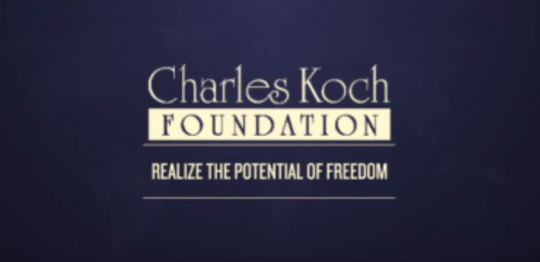

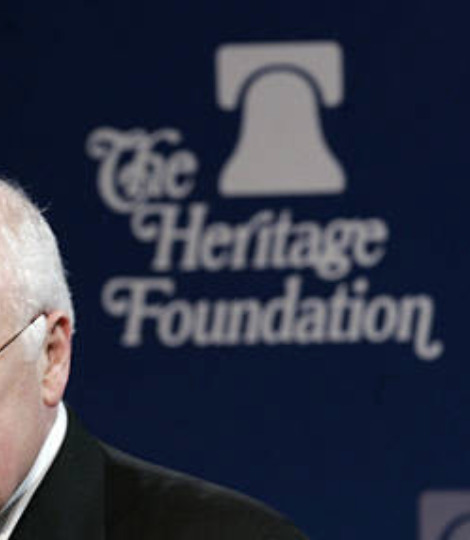



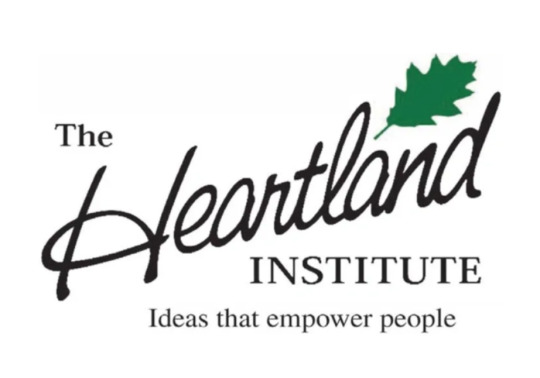
15 major "think tanks" and "institutes" fuel the talking points that overwhelm the American media landscape with an aggressive campaign against health care, public schools, environmental regulations, civil rights laws, and any form of social safety net.
Each of these think tanks and institutes are funded by the same handful of billionaires, nearly all of whom have a lineage that can be traced back to the John Birch Society.
In the words of author Caitlin Johnstone, “The term ‘think tank’ almost always refers to a group of academics hired by plutocrats to come up with reasons why it is very good and smart to do something very evil and stupid, and then to market those reasons at key points of influence.”
74 notes
·
View notes
Text
The NHS will last as long as there are folk left to fight for it” – Aneurin Bevan
I’m no fan of Keir Starmer or Rishi Sunak. Sunak is completely out of touch with ordinary people and Starmer will promise just about anything to get himself into power and then break those promise when it suits him. However when it comes to the future of the NHS I feel it will be safer under a Labour government than one run by free market, neo-liberal Tories.
From a purely selfish perspective - something the Conservative Party excels at - the NHS saves all of us a small fortune. When your child needs medical care it is free at the point of use; when your parents need medical care it is free at the point of use; and when YOU need medical care it is free at the point of use.
Of course we pay for this through taxes and national insurance contributions but the clue is in the phrase “national insurance”. Medical treatment in Britain, is, at the moment, paid for through collective funding. It is a system based on community, social responsibility, and the old fashioned concept of caring for your neighbour. . Aneurin Bevan, the "Father of the NHS” said:
“No society can legitimately call itself civilized if a sick person is denied medical aid because of lack of means."
It is a sad fact that Conservative Party members, many of them rich individuals who can afford private medical treatment, have been undermining the NHS because of their unwavering adherence to the ideological belief that all things run by private enterprise are good while all public sector institutions are bad. . The Tory’s will, of course deny this, claiming the NHS is save in their hands and that they have no plans to privatise it.
Lets look at the facts.
Despite Prime Minister David Cameron promising there would be no cuts to the NHS this was the headline in the Daily Mirror when the Conservatives took over from Labour in 2012.
“David Cameron cuts NHS spending by £500million.” (06/11/12)
Two years later and we have this headline from the Guardian:
“David Cameron accused of hypocrisy over £1.4bn ‘raid’ on NHS funding." (06/07/2012)
By 2014 NHS staff were on strike because of the Tory government refused to give them a 1% pay rise. Rows over poor pay and under-funding continue to this day.
While Jeremy Hunt was Health Secretary patient experience and staff moral took a dramatic turn for the worse. Despite presenting himself as a “champion of patient safety”, targets were missed, waiting times increased, and the very fabric of some hospitals began to crumble, leading to Hunt being labelled “the man who ruined the NHS”. (Open Democracy: 08/07/22)
In 2016 The Independent ran this headline:
“Jeremy Hunt co-authored book calling for NHS to be replaced with private insurance.” (10/02/2016)
Is it any wonder the NHS has been seriously under-funded and run down when the man in charge was an advocate of private medical health insurance? Millionaires like Cameron (£40m) Hunt (£15m) and Sunak (£651m) can afford to pay for expensive medical care but the rest of us are not so fortunate.
This brings me back to the purely selfish reason we should vote for the party most likely to protect the NHS. Below are some AVERAGE costs for private medical procedures and treatments in the USA provided by Statistica 2021
Heart valve replacement…….$170,000 £133,390
Heart bypass………………….......$123,000 £96,518
Cornea (per eye) ……………......$17,000 £13,339
IVF treatments ………………......$15,400 £12,084
Hysterectomy ………………….....$5200 £4,080
In addition, Americans have to pay for their stay in hospital. This fee is on top of medical treatment costs. According to Debt.org (30/11/23) the price for the average stay in hospital of 4.6 days is $13,262. (£10,406)
Whatever your political leanings, the protection and restoration of the NHS should take precedent over all other electoral considerations because we will ALL need medical treatment at some stage in our lives be that as a child or as an adult.
We know the Tory mantra "private sector good public sector bad” just doesn’t live up to reality: we only have to look at our polluted waterways to realise this. Whether Keir Starmer would be any better at protecting the NHS from profit motivated private companies is a moot point.
With headlines like:
“Can Wes Streeting’s private sector plans save the NHS?” (Guardian: 14/04/24)
and
“Labour’s Wes Streeting just used the SUN to talk up NHS privatisation” (Canary: 08/04/24)
we cannot rely on the Labour Party leadership to protect the NHS from the profiteering private sector, not least because Wes Streeting has been paid £175,000 from donors linked to private health firms. (National: 14/04/24) There is no such thing as a free lunch so one doesn’t have to wonder to hard what these “donors” might want in return for their money!
Even so, I feel there are those within the Labour Party who would work very hard to stop the leadership of the party from running down the NHS to the point of collapse, as is the Tory plan, so with great reservation I will be voting Labour in the coming elections.
Save Our NHS
#uk politics#rishi sunak#jeremy hunt#NHS#privatisation#wes streeting#keir starmer#private health care. medical insurance#social responsibility
10 notes
·
View notes
Text
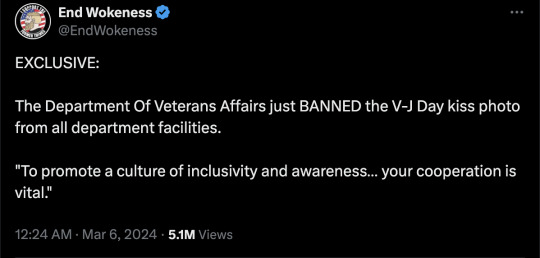
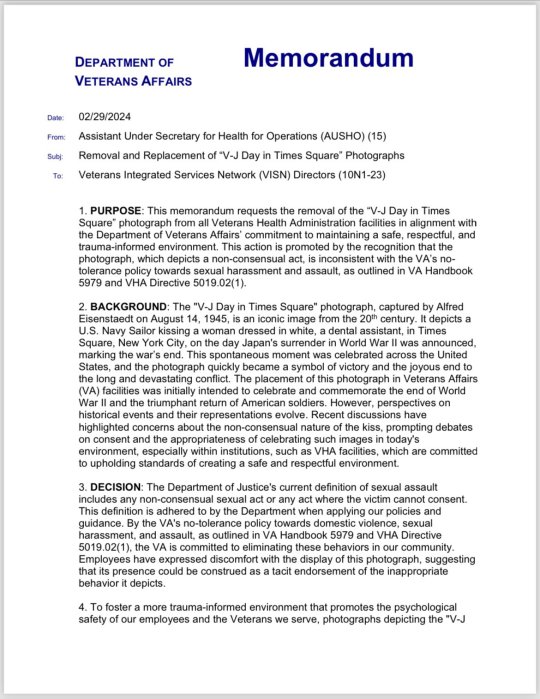
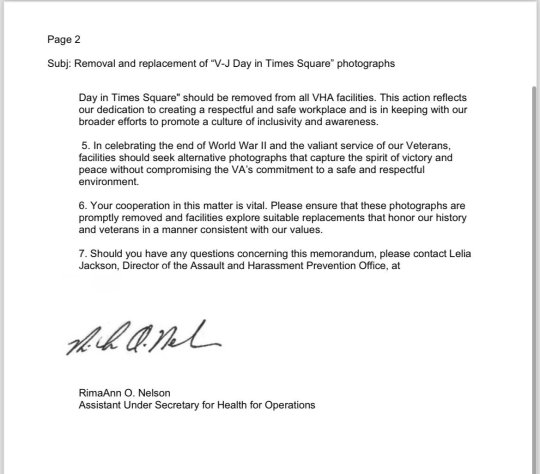

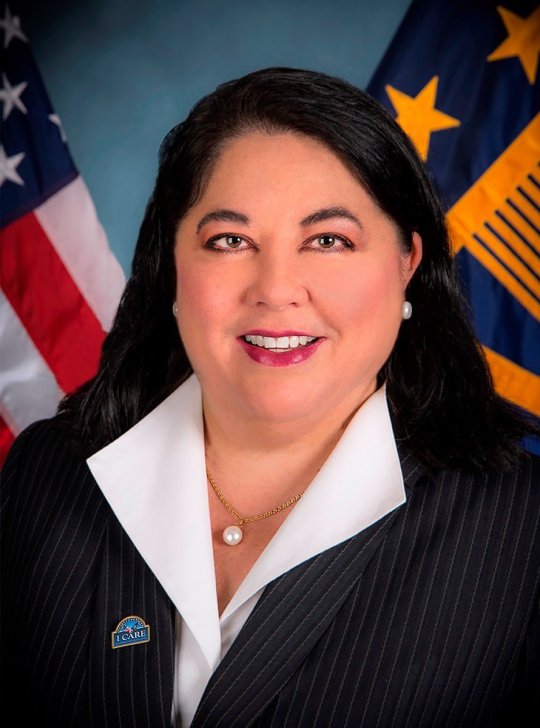
--

--
By: Leo Shane III
Published: Feb 5, 2024
Veterans Affairs Secretary Denis McDonough is overruling plans to ban the famous Times Square kiss photo marking the end of World War II from all department health care facilities, a move criticized as political correctness run amok.
The ban was announced internally at VA medical facilities late last month in a memo from RimaAnn Nelson, the Veterans Health Administration’s top operations official. Employees were instructed to “promptly” remove any depictions of the famous photo and replace it with imagery deemed more appropriate.
“The photograph, which depicts a non-consensual act, is inconsistent with the VA’s no-tolerance policy towards sexual harassment and assault,” the memo stated.
“To foster a more trauma-informed environment that promotes the psychological safety of our employees and the veterans we serve, photographs depicting the ‘V-J Day in Times Square’ should be removed from all Veterans Health Administration facilities.”
The memo garnered public scrutiny after it was posted online by the X account EndWokeness on Tuesday.
Just hours later, McDonough took to social media to reverse the memo.
“This image is not banned from VA facilities — and we will keep it in VA facilities,” said a post from his official X account. Department officials echoed in a separate statement that “VA will NOT be banning this photo from VA facilities.”
Officials said the memo should not have been sent out and was formally rescinded on Tuesday. They did not provide details of whether senior leaders were consulted on the matter ahead of Nelson’s memo.
The photograph was taken by journalist Alfred Eisenstaedt in New York City on Aug. 14, 1945, as Americans celebrated Japan’s surrender at the end of World War II. Other journalists, including military reporters, also captured the moment.
The shot shows a U.S. sailor grabbing and kissing a woman he did not know amid a joyous, party atmosphere in Times Square. The identities of the individuals in the photo have been disputed over the years.
In her memo, Nelson noted that use of the photo in VA facilities “was initially intended to celebrate and commemorate the end of World War II and the triumphant return of American soldiers. However, perspectives on historical events and their representations evolve.”
Nelson wrote that the non-consensual nature of the kiss and “debates on consent and the appropriateness of celebrating such images” led to the decision. Senior leaders did not provide an explanation for the reversal.
VA officials could not provide details on how many facilities are currently displaying the photo and whether veterans have complained about use of the image.
McDonough has made veterans outreach and inclusion key priorities for the department over the last three years, including rewriting the VA motto with gender-neutral language.
==
Activists always take it upon themselves to make themselves the center of any issue. If they feel offended, then everyone else must feel offended as well. Even - and usually especially - if the activist feels offended on someone else's behalf.
You don't get to pretend you're more offended than the people who were actually there and were actually involved.
#V-J Day in Times Square#Times Square kiss#V-J Day#World War II#victimhood culture#victimhood#DEI bureaucracy#diversity#equity#inclusion#diversity equity and inclusion#religion is a mental illness#DEI apparatchiks
9 notes
·
View notes
Note
Genuinely asking why are Americans all talk and no action. Like theres sooooo many ppl just complaining about wages,health-care but then yall aren't protesting or doing anything?????? Like in my country we complain but we also protest. Why aren't the most affected states doing anything fr
this question involves a lot of components you might not even care about but sure okay ill try
a lot of americans are very apathetic to our institutions and/or think the institutions are fine as they are. a lot of right leaning and conservative americans legitimately think anything that minutely resembles a social safety net is socialist commie bullshit and oh why can't everyone just work hard and pick themselves up by their bootstraps. then theres a general american climate of people just not caring about politics, local or national, for various reasons. people often do not pay much attention unless its big buzz event stuff, often pointed out for them by their party.
a lot of people are sick of seeing nothing getting done (generally) in our government, but also people who are tuned in may get burntout from how obviously lobbied to hell everything is. a lot of stuff that gets passed often goes against a lot of american citizens wants or interests. you can see how over time the american public gets apathetic to this.
also notable, you act like we do not protest anything ever, which just isn't true. social movements often come in waves with peaks occuring when prominent events happen. theres always political movement and protests in the states when big shit happens, but there's gonna always be less activity for stuff thats gruelingly slow to change and doesn't really have "large" events attached to it, such as healthcare or minimum wage. not saying no one is fighting for those things as i type this, but most americans usually cannot agree on the best ways to solve these things. these issues are actually nastily hardliner issues that protesting would be...interesting for sure. i think most people think protests wouldn't change many minds and thats likely why we don't see more of it tbh. everyone is set in their red or blue corner.
continuing with the party talk, americans often put the responsibilities of those issues on their representatives, not ourselves. our job is "vote". its their job to go fight for those issues in congress. and i already stated americans are quite lenient about how much they pay attention to their local or national politics in the first place, so you can easily see the downsides to this. "put pressure on ur reps!" you say, well yeah duh, but that would require a majority to care or pay attention to their reps enough to do that. again, i think a lot of americans have a dejected attitude towards government and politics and very little interest in personal civic engagement. the reasons why to that particular element are outside the scope of your question though, but i think it helps explain why you don't see massive nationwide protests for all of our hardliner issues. not to mention protests occur more often at a local or state level rather than national since state interests can vary from national on most issues, making it difficult for outsiders to see the actual social protests or movements occuring within states, so i wouldn't ever say we do not do anything ever. theres lots of active and wonderful politically engagement americans nationwide.
also this is a tangent but you ask why states most affected don't do more and its likely, depending on the issue, a lack of time, energy, and resources. people who are struggling to live and go about their daily lives will find less time, energy, and resources to invest into going out and physically protesting shit. i think thats kind of obvious. and in a country with very little traditions of strong protest culture such as in, say, France, and one that also has strong cultural values of individualism, capitalism, and classical liberalism to a point, well, it all very much explains a lot about what americans prioritize or actually see as a problem or threat.
8 notes
·
View notes
Text
Thanks to @gardening-tea-lesbian for posting about this and bringing it to my attention!
--
The Biden-Harris Administration wants to make substance abuse treatment more accessible for all prisoners in the U.S. Addiction is common among people in prison, and treatment helps fight recidivism and reduce overdose rates.
From Federal Prisons To State Prisons
By this summer, all federal prisons will offer addiction treatment, Dr. Rahul Gupta, director of the White House Office of National Drug Control Policy, said last week.
Federal officials want states to follow suit. Starting this spring, Medicaid funds will be set aside for states to use in their own jails and prisons to provide mental health services, including SUD treatment.
Approximately 25% of all Americans received Medicaid benefits in 2022. For people with low incomes, Medicaid is the largest provider of funds for healthcare services.
The Biden-Harris Administration has shown a commitment to helping underserved communities receive addiction prevention, treatment, and recovery services.
This includes services for rural populations and Tribal populations along with people who are incarcerated.
Addiction In Our Prisons
It’s hard to know precisely how many incarcerated people have an SUD, but the National Institute on Drug Abuse (NIDA) estimates that about 65% of all inmates do.
NIDA estimates that another 20%, who didn’t meet the official criteria for an SUD, were under the influence of drugs or alcohol when they committed a crime.
Overall in America, about 40 million people ages 13 and over are living with addiction, or about 12% of the population, according to the 2020 National Survey on Drug Use and Health.
How Treatment Helps Prison Populations
Drug abuse treatment is effective. For people in prison, receiving treatment can mean the difference between staying out of jail once released or returning behind bars.
It can also provide them with the mental clarity and tools to meet the challenges of life, improve their mental health, and succeed in their relationships and work.
Aids Long-Term Recovery
The Biden-Harris Administration is focusing on evidence-based treatment methods to help people who are incarcerated get and stay on the path to addiction recovery.
This includes medication-assisted treatment (MAT), which combines the use of medications like buprenorphine with behavioral therapy to treat opioid abuse.
Buprenorphine, the first medication that could be prescribed by physicians to treat opioid use disorders, helps people overcome addiction in a few ways.
Using buprenorphine helps with recovery by:
reducing cravings
diminishing opioid withdrawal symptoms, which include flu-like symptoms and severe anxiety
improving safety, if overdose occurs
lessening the chance of misuse
One study in support of buprenorphine’s effectiveness showed that participants receiving the medication were almost twice as likely to remain in treatment and not relapse.
Prevents Overdose Deaths
According to U.S. News and World Report, the leading cause of death among people newly released from prison is drug overdose.
This is partly due to the fact that their tolerance levels decrease while incarcerated, so they aren’t able to tolerate the same amount of the drug as before they were in prison.
The buprenorphine study mentioned above also revealed that people not receiving the treatment had a 20% mortality rate."
-via Addiction Resources.net, 3/9/23
#addiction#cw drug use#cw addiction#addiction treatment#mass incarceration#medicaid#united states#us politics#prison reform#prison industrial complex#biden#kamala harris#evidence based medicine#healthcare access#opiod crisis#opiod epidemic#buprenorphine#drug treatment#good news#hope#voting matters
53 notes
·
View notes